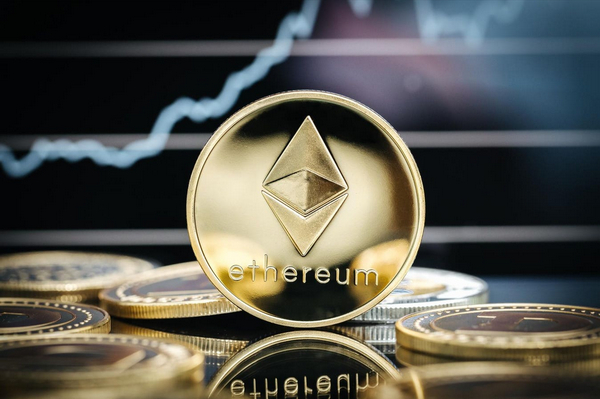-
 Bitcoin
Bitcoin $106,437.2012
0.82% -
 Ethereum
Ethereum $2,442.5287
0.82% -
 Tether USDt
Tether USDt $1.0005
-0.02% -
 XRP
XRP $2.1812
-0.27% -
 BNB
BNB $645.1327
0.45% -
 Solana
Solana $146.2379
0.39% -
 USDC
USDC $0.9999
-0.01% -
 TRON
TRON $0.2751
0.92% -
 Dogecoin
Dogecoin $0.1662
-0.23% -
 Cardano
Cardano $0.5827
-1.22% -
 Hyperliquid
Hyperliquid $37.5225
0.04% -
 Bitcoin Cash
Bitcoin Cash $479.0877
4.02% -
 Sui
Sui $2.7846
-3.27% -
 Chainlink
Chainlink $13.3576
0.84% -
 UNUS SED LEO
UNUS SED LEO $9.0252
-1.20% -
 Stellar
Stellar $0.2455
-1.07% -
 Avalanche
Avalanche $18.0680
-1.81% -
 Toncoin
Toncoin $2.8948
-1.07% -
 Shiba Inu
Shiba Inu $0.0...01164
-1.65% -
 Litecoin
Litecoin $85.0637
-0.06% -
 Hedera
Hedera $0.1526
-0.89% -
 Monero
Monero $316.2941
0.78% -
 Ethena USDe
Ethena USDe $1.0003
-0.04% -
 Polkadot
Polkadot $3.4113
-1.87% -
 Dai
Dai $1.0000
-0.01% -
 Bitget Token
Bitget Token $4.4488
5.16% -
 Uniswap
Uniswap $7.1740
3.09% -
 Pi
Pi $0.5968
11.43% -
 Pepe
Pepe $0.0...01010
-0.65% -
 Aave
Aave $264.3189
0.40%
how long ethereum transaction takes
The average time for an Ethereum transaction to complete can vary from a few seconds to several hours, depending on factors such as network congestion and gas fees.
Oct 16, 2024 at 11:53 am

How Long Do Ethereum Transactions Take?
Step 1: Understanding Factors Affecting Transaction Time
The time it takes for an Ethereum transaction to complete depends on several factors:
- Network Congestion: When there is a high volume of transactions on the Ethereum network, it can slow down processing times.
- Gas Fees: The higher the gas fee associated with a transaction, the faster it will be processed.
- Transaction Size: Larger transactions typically take longer to process.
- Node Infrastructure: Transactions submitted to faster nodes may be processed more quickly.
- Block Inclusion Time: This refers to the time it takes for a node to accept a transaction into a new block.
Step 2: Average Transaction Time
On average, Ethereum transactions can take anywhere from a few seconds to several hours to complete. However, it's important to note that these are just averages, and the actual time may vary depending on the factors mentioned above.
Step 3: Block Inclusion Time
The average block inclusion time on the Ethereum network is around 13 seconds. This means that once a transaction is submitted to a node, it typically takes around 13 seconds for it to be added to a new block on the blockchain.
Step 4: Confirmation Time
After a transaction is included in a block, it is considered "confirmed." The number of confirmations required for a transaction to be considered fully settled is commonly set at 6 or more. With 6 confirmations, the transaction has a 99.99% probability of being irreversible.
Step 5: Estimated Transaction Time
To estimate the transaction time for a specific Ethereum transfer, you can use online tools like [ETH Gas Station](https://ethgasstation.info/) or [Bordeless](https://bordeless.io/ethfees). These tools provide real-time estimates based on current network conditions and gas fees.
Step 6: Tips for Faster Transactions
- Submit Transactions During Off-Peak Hours: When network congestion is lower, transactions are processed faster.
- Use High Gas Fees: Paying higher gas fees gives your transaction priority.
- Split Large Transactions: If you need to send a large amount of ETH, consider splitting it into smaller transactions.
- Choose Faster Nodes: Some Ethereum nodes are faster than others. Use services that connect to the fastest nodes.
Disclaimer:info@kdj.com
The information provided is not trading advice. kdj.com does not assume any responsibility for any investments made based on the information provided in this article. Cryptocurrencies are highly volatile and it is highly recommended that you invest with caution after thorough research!
If you believe that the content used on this website infringes your copyright, please contact us immediately (info@kdj.com) and we will delete it promptly.
- DeFi Protocols Meet Tokenized Assets: RWA News and the Future of Finance
- 2025-06-25 21:05:12
- PEPE Price, Shiba Inu, and Angry Pepe Fork: Meme Coin Mania or Solid Investments?
- 2025-06-25 21:05:12
- South Korean Banks Eye Won-Pegged Stablecoin: A New Era for Digital Finance?
- 2025-06-25 20:45:13
- From Meme Dreams to Wealth Streams: Bonk Coin, Bitcoin Solaris, and the Future of Wealth Creation
- 2025-06-25 20:45:13
- Solana, Bitcoin, and the Crypto Crystal Ball: Price Predictions and Beyond
- 2025-06-25 21:25:12
- Pepe Coin, Crypto, and High Returns: Is Little Pepe the Next Big Thing?
- 2025-06-25 21:25:12
Related knowledge

How to customize USDT TRC20 mining fees? Flexible adjustment tutorial
Jun 13,2025 at 01:42am
Understanding USDT TRC20 Mining FeesMining fees on the TRON (TRC20) network are essential for processing transactions. Unlike Bitcoin or Ethereum, where miners directly validate transactions, TRON uses a delegated proof-of-stake (DPoS) mechanism. However, users still need to pay bandwidth and energy fees, which are collectively referred to as 'mining fe...

USDT TRC20 transaction is stuck? Solution summary
Jun 14,2025 at 11:15pm
Understanding USDT TRC20 TransactionsWhen users mention that a USDT TRC20 transaction is stuck, they typically refer to a situation where the transfer of Tether (USDT) on the TRON blockchain has not been confirmed for an extended period. This issue may arise due to various reasons such as network congestion, insufficient transaction fees, or wallet-rela...

How to cancel USDT TRC20 unconfirmed transactions? Operation guide
Jun 13,2025 at 11:01pm
Understanding USDT TRC20 Unconfirmed TransactionsWhen dealing with USDT TRC20 transactions, it’s crucial to understand what an unconfirmed transaction means. An unconfirmed transaction is one that has been broadcasted to the blockchain network but hasn’t yet been included in a block. This typically occurs due to low transaction fees or network congestio...

How to check USDT TRC20 balance? Introduction to multiple query methods
Jun 21,2025 at 02:42am
Understanding USDT TRC20 and Its ImportanceUSDT (Tether) is one of the most widely used stablecoins in the cryptocurrency market. It exists on multiple blockchain networks, including TRC20, which operates on the Tron (TRX) network. Checking your USDT TRC20 balance accurately is crucial for users who hold or transact with this asset. Whether you're sendi...

What to do if USDT TRC20 transfers are congested? Speed up trading skills
Jun 13,2025 at 09:56am
Understanding USDT TRC20 Transfer CongestionWhen transferring USDT TRC20, users may occasionally experience delays or congestion. This typically occurs due to network overload on the TRON blockchain, which hosts the TRC20 version of Tether. Unlike the ERC20 variant (which runs on Ethereum), TRC20 transactions are generally faster and cheaper, but during...

The relationship between USDT TRC20 and TRON chain: technical background analysis
Jun 12,2025 at 01:28pm
What is USDT TRC20?USDT TRC20 refers to the Tether (USDT) token issued on the TRON blockchain using the TRC-20 standard. Unlike the more commonly known ERC-20 version of USDT (which runs on Ethereum), the TRC-20 variant leverages the TRON network's infrastructure for faster and cheaper transactions. The emergence of this version came as part of Tether’s...

How to customize USDT TRC20 mining fees? Flexible adjustment tutorial
Jun 13,2025 at 01:42am
Understanding USDT TRC20 Mining FeesMining fees on the TRON (TRC20) network are essential for processing transactions. Unlike Bitcoin or Ethereum, where miners directly validate transactions, TRON uses a delegated proof-of-stake (DPoS) mechanism. However, users still need to pay bandwidth and energy fees, which are collectively referred to as 'mining fe...

USDT TRC20 transaction is stuck? Solution summary
Jun 14,2025 at 11:15pm
Understanding USDT TRC20 TransactionsWhen users mention that a USDT TRC20 transaction is stuck, they typically refer to a situation where the transfer of Tether (USDT) on the TRON blockchain has not been confirmed for an extended period. This issue may arise due to various reasons such as network congestion, insufficient transaction fees, or wallet-rela...

How to cancel USDT TRC20 unconfirmed transactions? Operation guide
Jun 13,2025 at 11:01pm
Understanding USDT TRC20 Unconfirmed TransactionsWhen dealing with USDT TRC20 transactions, it’s crucial to understand what an unconfirmed transaction means. An unconfirmed transaction is one that has been broadcasted to the blockchain network but hasn’t yet been included in a block. This typically occurs due to low transaction fees or network congestio...

How to check USDT TRC20 balance? Introduction to multiple query methods
Jun 21,2025 at 02:42am
Understanding USDT TRC20 and Its ImportanceUSDT (Tether) is one of the most widely used stablecoins in the cryptocurrency market. It exists on multiple blockchain networks, including TRC20, which operates on the Tron (TRX) network. Checking your USDT TRC20 balance accurately is crucial for users who hold or transact with this asset. Whether you're sendi...

What to do if USDT TRC20 transfers are congested? Speed up trading skills
Jun 13,2025 at 09:56am
Understanding USDT TRC20 Transfer CongestionWhen transferring USDT TRC20, users may occasionally experience delays or congestion. This typically occurs due to network overload on the TRON blockchain, which hosts the TRC20 version of Tether. Unlike the ERC20 variant (which runs on Ethereum), TRC20 transactions are generally faster and cheaper, but during...

The relationship between USDT TRC20 and TRON chain: technical background analysis
Jun 12,2025 at 01:28pm
What is USDT TRC20?USDT TRC20 refers to the Tether (USDT) token issued on the TRON blockchain using the TRC-20 standard. Unlike the more commonly known ERC-20 version of USDT (which runs on Ethereum), the TRC-20 variant leverages the TRON network's infrastructure for faster and cheaper transactions. The emergence of this version came as part of Tether’s...
See all articles
























































































